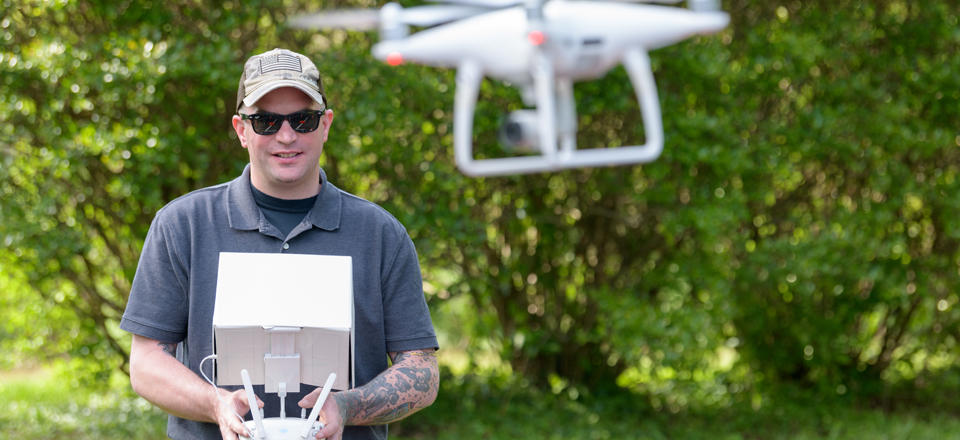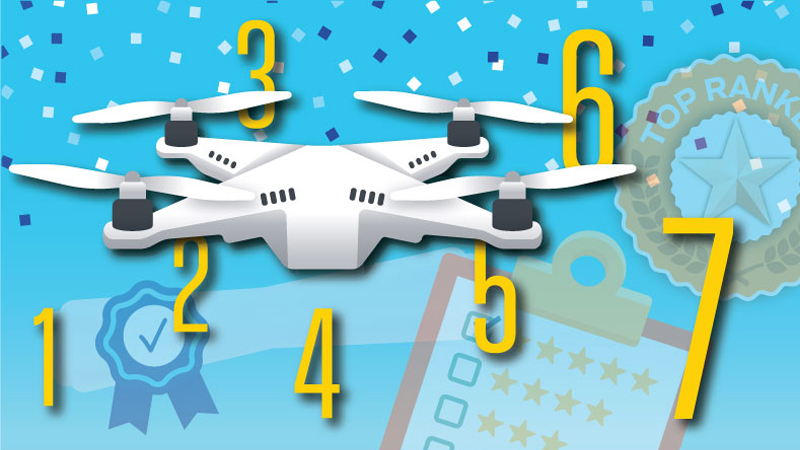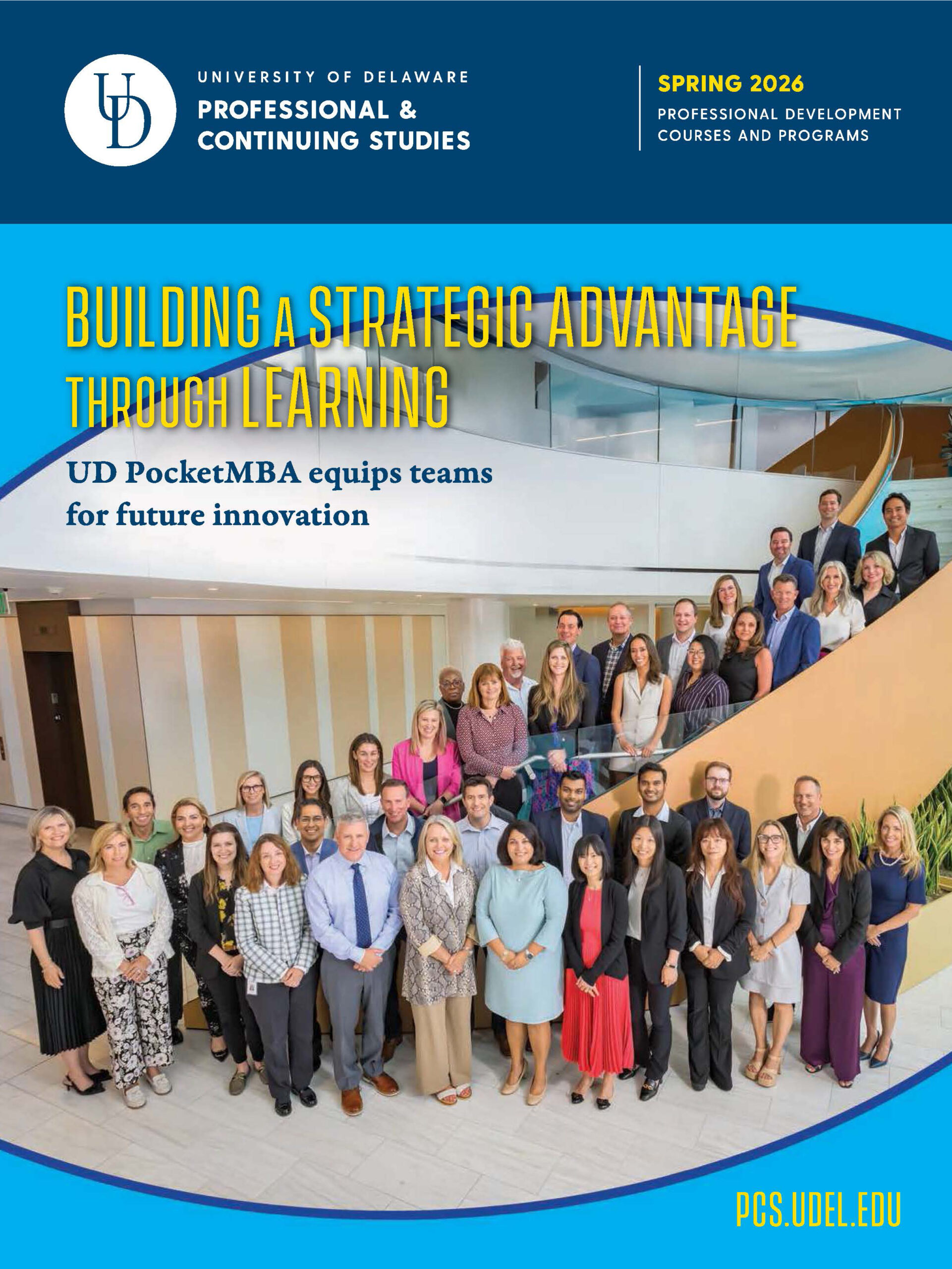
Are you certified?
Next program starts February 28

- Prepare for the FAA’s airman knowledge test
- Certification applicable to a growing list of professions
- 3-day weekend live-online, instructor-led course — Feb. 28, March 1 and 7, 2026, 8 a.m-1 p.m.
- Discounts available
- LEARN MORE — View an instructor info presentation

Legally flying a drone for commercial use requires a Federal Aviation Administration (FAA) Part 107 remote pilot certificate. Dedicated to serving all aspiring professional drone pilots, UD PCS has prepared over 300 individuals for this valuable certification since the inception of its award-winning Ground School and FAA Part 107 Test Prep program in 2018. During this intensive course, flight instructors provide comprehensive classroom training and prepare drone pilots for the exam, which is conducted at an FAA-certified testing center.
Course topics include regulations, airspace, weather, loading and performance, and operations. The exam ensures that commercial drone pilots have the ability to act responsibly, coordinate with air traffic control in case of emergencies, read aeronautical maps, and abide by all general aviation regulations and specific regulations pertaining to UAS. (Note: This is a test prep program. The examination is not administered as part of the class.)
The program can also be presented to groups of any size via private, onsite delivery. Customized training clients have included numerous agencies and organizations throughout the region. Please contact UD PCS to discuss pricing and scheduling options.
Participants in Professional Drone Pilot: Ground School and FAA Part 107 Test Prep must be at least 16 years old.

Instructor Paige Fitzgerald has prepared numerous students from diverse professional sectors to earn the FAA Part 107 remote pilot certificate. Drawing on her experience as both a drone pilot and an instructor, Fitzgerald has seven reasons why people should take her class. – LEARN MORE
REGISTRATION AND SCHEDULE
|
PROGRAM DETAILS
Who should participate in this program?
- First responders (police, fire, rescue personnel)
- Investigators
- Insurance adjusters and real estate agents
- Reporters, film makers, producers, photographers, marketers, web designers
- Engineers, construction professionals, roofers
- Accident scene investigators
- Site and structure inspectors (tower, roofing, building, land surveyor, electrical line, oil and gas fields, agriculture)
- Construction estimators and project managers
- Aerial photographers
- Anyone interested in starting a UAS-based business
- UAS freelancers
- Emergency management professionals (federal, state and municipal level)
- Any other professionals or hobbyists using UAVs
Instructor
Paige Fitzgerald serves as the director of UAS training for Adam Ringle Consulting. Fitzgerald has successfully prepared dozens of students from diverse professional sectors to earn their FAA Part 107 remote pilot certificate by passing the Federal Aviation Administration’s airman knowledge test and has developed a flight-training program utilizing a variety of platforms in multiple environments. A specialist in program management, she can not only provide training, but also develop the foundational documents needed for a successful UAS program, such as policies, procedures and checklists. Fitzgerald is well-versed in public sector grant management and can help identify funding solutions to establish or grow UAS programs. Her extensive public messaging experience across a variety of projects and proven record of creating buy-in among diverse stakeholders can be leveraged to create interagency support for those looking to start new UAS programs.
Fitzgerald has experience in a variety of instructional environments, including online learning, classroom courses and hands-on skills training. She currently serves an instructor for Delaware Technical Community College’s Homeland Security and Emergency Management degree program. She was previously a planner at the Delaware Emergency Management Agency, where she oversaw the administration of its UAS program, as well the administration of the state UAS committee. She is highly knowledgeable of FAA regulations and requirements, including 14 CFR Part 107, especially as it relates to public safety flight programs. Her flight experience includes many complex missions in adverse conditions, such as night flying, high wind and multi-use or controlled airspace. Other areas of specialization include NIMS compliant program development and reporting for flight programs.
Course outline
- Course Introduction and Overview
- 14 CFR Part 107 - Regulations
- Airspace Classification
- Operational Requirements
- Flight Restrictions
- Airport Operations
- Loading and Performance
- Radio Communication Procedures
- Emergency Procedures
- Crew Resource Management
- Physiological Factors affecting Pilot Performance
- Aeronautical Decision Making
- Aviation Weather
Learner outcomes
Upon completion of this course, participants will be able to understand and apply the following:
- 14 CFR Part 107 Regulation
- National Airspace System
- Airspace and Planning
- Weather Theory
- Aviation Weather Services
- Weight and Balance Loading and Performance
- Flight Operations
- Safety Risk Management
- Aeromedical Factors
Technology requirements
A laptop or desktop computer (PC or Mac) is required to participate in this class.
What our students say
- “Because of all the material to grasp, I was really nervous going into the exam. But then I saw that everything they taught us was on the test. They didn’t provide us with the actual questions, but all of the information was applicable.” - Tavis Miller
- “Along with the dramatic savings in cost and time, it is much safer to do the inspections with a drone since we no longer need to have people climbing ladders and walking on roofs. You just fly it up there, take some pictures, and get some great results.” - Brian Wagner


